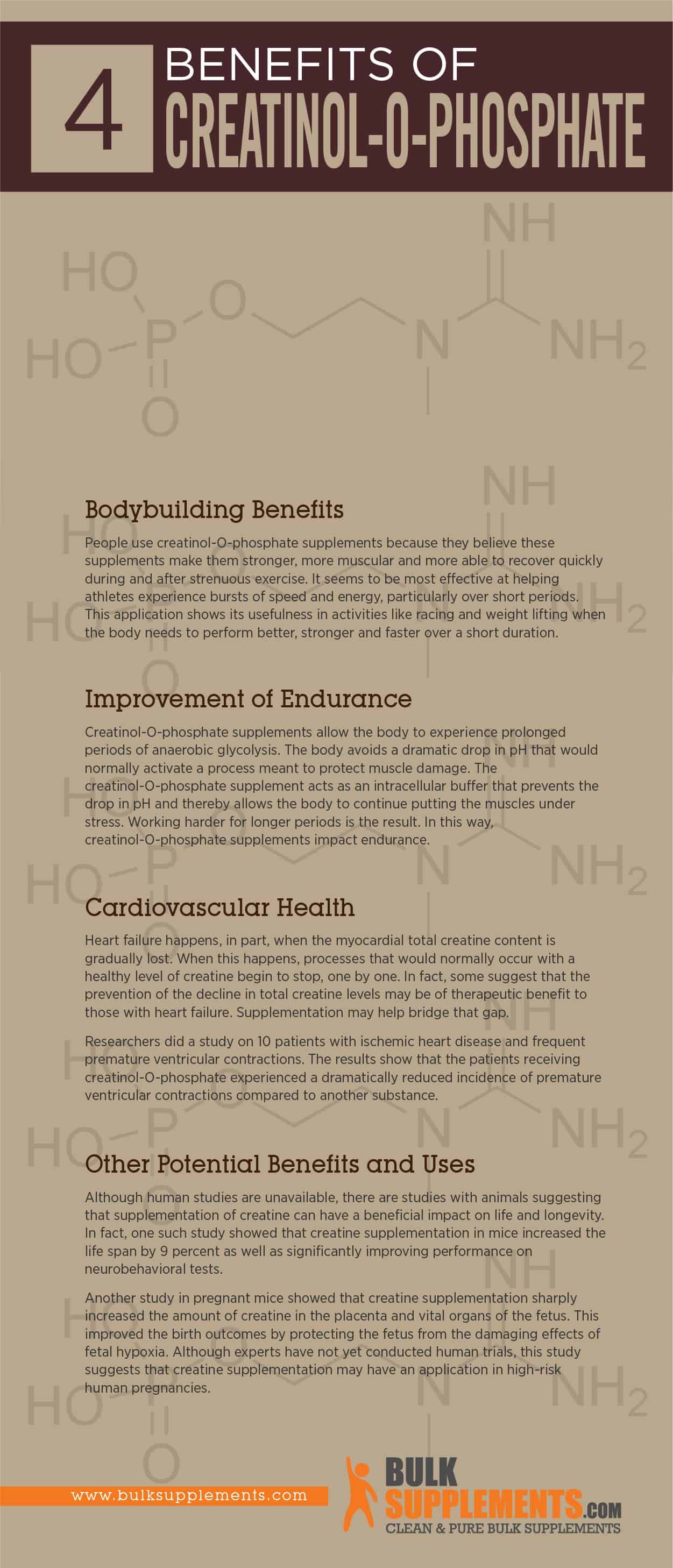Creatinol-O-Phosphate: Benefits, Side Effects & Dosage
by James Denlinger Digital Marketing StrategistWhat is Creatinol-O-Phosphate?
Creatinol-O-phosphate (COP) is a synthetic compound that goes by the scientific name N-methyl-N-(beta-hydroxyethyl) guanidine O-phosphate. Despite its correlation to creatine, it has entirely different uses and effects. Therefore, one should view it as a completely different compound.
Creatinol-O-Phosphate vs. Creatine
Creatine is a naturally occurring substance found in the muscle cells of all vertebrates. It plays a primary role in providing energy to all cells of the body, particularly muscle cells. Your body makes creatine from the amino acids glycine and arginine. Once produced, it is stored in the muscles as phosphocreatine. And when a person has higher levels of phosphocreatine stored in their cells, they can produce higher quantities of a molecule called ATP. Since ATP is an energy source for the body, the more ATP you have stored means more energy. And the more energy you have, the harder you can exercise.
Creatinol-O-phosphate, on the other hand, is a synthetically created compound analogous to creatine and provides some similar benefits. However, unlike creatine, creatinol-O-phosphate is resistant to a process called cyclization — a chemical process where chemical molecules form a ring with other molecules. When cyclization takes place in creatine, it produces a by-product known as creatinine. This process then renders the creatine useless for muscle building. In contrast, creatinol-O-phosphate maintains its structural integrity, allowing the body to gain the full benefit of its presence.
How Does Creatinol-O-Phosphate Work?
Overrides Protective Mechanisms
When you are intensely pushing muscles to their limits, your body produces lactic acid. Then, as the lactic acid builds to an excessive level, the body experiences a drop in intracellular pH. This buildup of lactic acid and drop in pH(i) is the body’s way of protecting the muscles from overuse; effectively shutting down further activity to prevent muscular damage. However, creatinol-O-phosphate saturates the muscles and continues delivering energy to the muscle cells even in the presence of excess lactic acid.
Prolongs Anaerobic Glycolysis
Creatinol-O-phosphate prolongs the process of anaerobic glycolysis by acting as a buffer between cells. The supplement thus allows the muscles to contract beyond the point at which the protective measures would typically kick in and shut down activity. In this way, creatinol-O-phosphate affects endurance.
When you use creatinol-O-phosphate continuously, you can subject your muscles to more tension longer. This results in your body growing more muscle mass.
Creatinol-O-Phosphate Uses
Creatinol-O-phosphate was originally designed to work as a cardioprotective drug that was also used to treat irregular heartbeats because it helps improve heart performance and ionic balance. Toxicological studies confirmed that creatinol-O-phosphate is well-tolerated, lacks side effects and has a favorable therapeutic index.
Over time, it showed up as a replacement for creatinol in nutritional supplements because of its ability to sustain anaerobic glycolysis. Scientists already understood creatine’s role in muscle building and sought a substitute that would not cave under the pressure of cyclization.
Creatinol-O-Phosphate Benefits
Bodybuilding Benefits
People use creatinol-O-phosphate supplements because they believe these supplements make them stronger, more muscular and more able to recover quickly during and after strenuous exercise. It seems to be most effective at helping athletes experience bursts of speed and energy, particularly over short periods. This application shows its usefulness in activities like racing and weight lifting when the body needs to perform better, stronger and faster over a short duration.
Improvement of Endurance
Creatinol-O-phosphate supplements allow the body to experience prolonged periods of anaerobic glycolysis. The body avoids a dramatic drop in pH that would normally activate a process meant to protect muscle damage. The creatinol-O-phosphate supplement acts as an intracellular buffer that prevents the drop in pH and thereby allows the body to continue putting the muscles under stress. Working harder for longer periods is the result. In this way, creatinol-O-phosphate supplements impact endurance.
Cardiovascular Health
Heart failure happens, in part, when the myocardial total creatine content is gradually lost. When this happens, processes that would normally occur with a healthy level of creatine begin to stop, one by one. In fact, some suggest that the prevention of the decline in total creatine levels may be of therapeutic benefit to those with heart failure. Supplementation may help bridge that gap.
Researchers did a study on 10 patients with ischemic heart disease and frequent premature ventricular contractions. The results show that the patients receiving creatinol-O-phosphate experienced a dramatically reduced incidence of premature ventricular contractions compared to another substance.
Other Potential Benefits and Uses
Although human studies are unavailable, there are studies with animals suggesting that supplementation of creatine can have a beneficial impact on life and longevity. In fact, one such study showed that creatine supplementation in mice increased the life span by 9 percent as well as significantly improving performance on neurobehavioral tests.
Another study in pregnant mice showed that creatine supplementation sharply increased the amount of creatine in the placenta and vital organs of the fetus. This improved the birth outcomes by protecting the fetus from the damaging effects of fetal hypoxia. Although experts have not yet conducted human trials, this study suggests that creatine supplementation may have an application in high-risk human pregnancies.
 PIN IT
PIN ITCreatinol-O-Phosphate Side Effects
A study published in the U.S. National Library of Medicine shows that after creatinol-O-phosphate has been used by the cells, it leaves the body through urination. And afterward, there appear to be zero side effects.
Creatinol-O-Phosphate Dosage
Dosage
Mix two grams (a little less than one teaspoon) of creatinol-O-phosphate powder in at least eight ounces of water and drink it in full before a workout. Always drink plenty of water while supplementing with this or any product to avoid dehydration.
Once the body absorbs COP, it could take up to seven days before any effects could become noticeable. But if you see no change, change the dose accordingly or as directed by a physician. Additionally, creatinol-O-phosphate powder does not contain any fillers of any kind and is free of sugar, soy, dairy, yeast, gluten, corn and additives.
When to Take
People who are using a creatinol-O-phosphate supplement may find the best results by taking the supplement 15 to 30 minutes before exercising. Also, to help the body absorb creatinol-O-phosphate better, take the supplement with carbohydrates or proteins that digest quickly. This will help ensure that the compound enters and saturates your muscle cells before your workout begins.
The Bottom Line
If you want to protect and enhance your gains, creatinol-O-phosphate may be just what you need. This pure supplement has no known side effects and works to protect cardiovascular health.
So, if you are looking for a means to recover faster from intense training sessions and feel less lactic acid burn while exercising, creatinol-O-phosphate is worth trying. Moreover, this supplement is widely available at a reasonable price. It is allowed as a performance enhancer and does not require a medical prescription. Note that you should always consult with a qualified healthcare practitioner before trying any new supplements.
Sponsor Ads
Created on Mar 29th 2020 22:17. Viewed 290 times.




